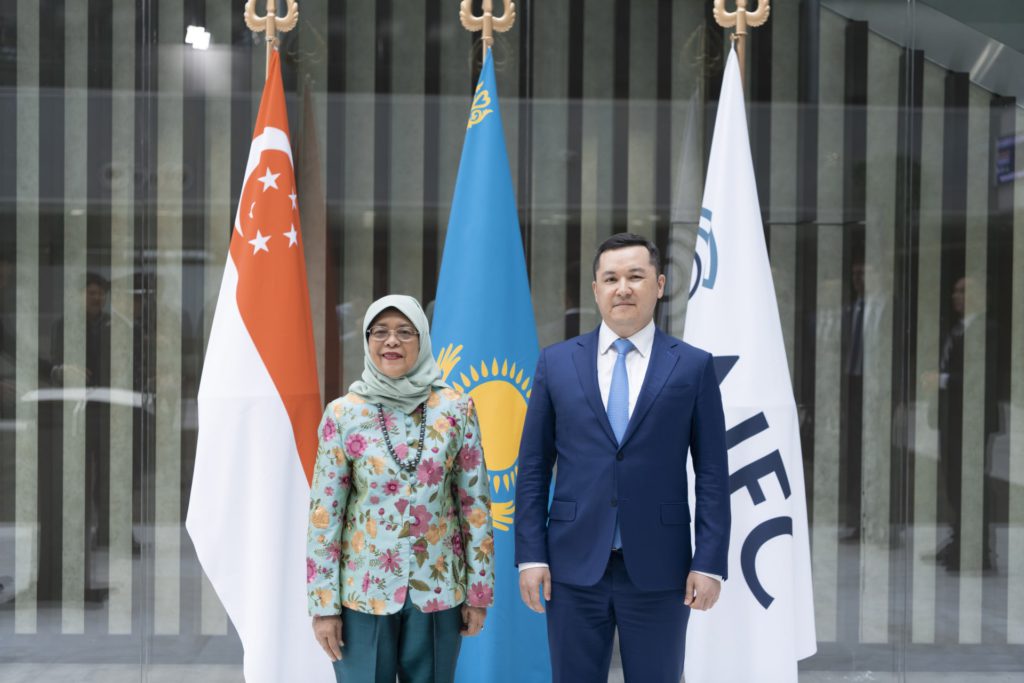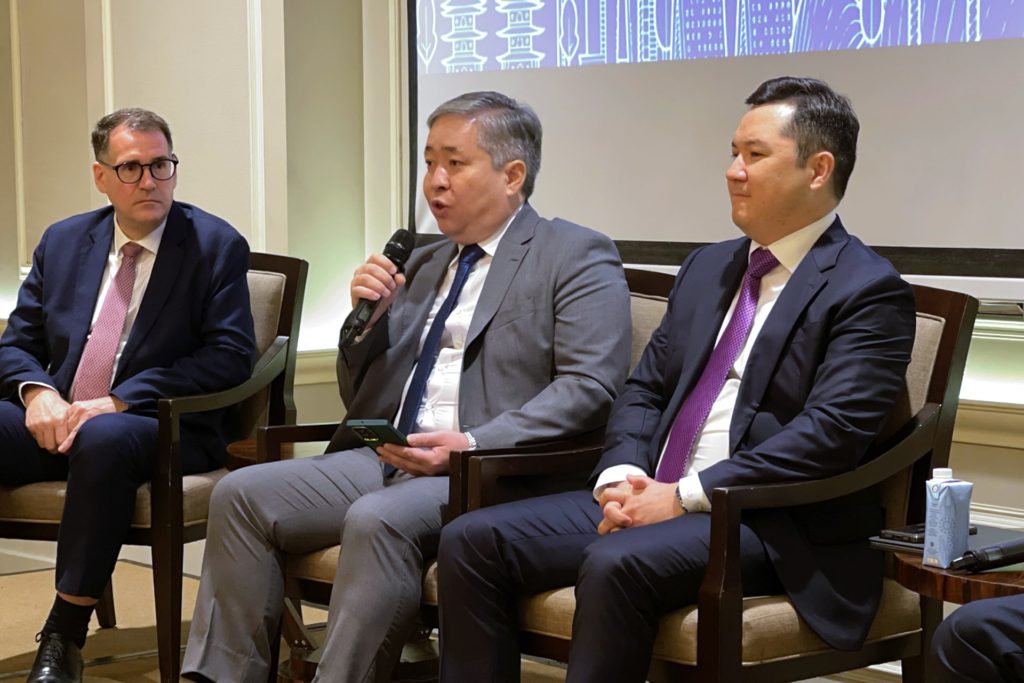Since gaining independence in 1991, Kazakhstan has strategically positioned itself as a nexus between Europe and Asia, evolving into a regional trade and commerce hub over the past three decades. More than 80% of goods bound for Europe from China and Central Asia, measured by volume, travel through Kazakhstan.
Recognizing the value of Kazakhstan’s abundant natural resources, global corporations also propelled the country into the league of key players in material exports.
In recent years, however, Kazakhstan has garnered increasing amounts of interest for more than just traditional trade and commerce. The Central Asian nation has placed significant emphasis on investments in infrastructure and logistics, with regional development and cooperation topping its economic agenda.
In 2022, Kazakhstan witnessed a surge in gross foreign direct investment (FDI), totaling USD 28 billion—a 17.7% uptick from 2021’s USD 23.8 billion. This figure is not only the highest logged by the country in a decade, but also reflects the global influx of investments from Europe, the Asia Pacific, the US, and beyond.
Central to this trajectory is the Astana International Financial Centre (AIFC), a financial hub established in the capital city of Astana, in 2018. Renat Bekturov currently serves as the governor of the AIFC. In a recent interview with KrASIA, Bekturov unravels Kazakhstan’s formula to expanding its footprint in the global financial landscape, and elaborates on the role played by the AIFC in executing this blueprint.
The following interview has been edited and consolidated for brevity and clarity.
KrASIA (KR): What are the key objectives of the AIFC?
Renat Bekturov (RB): The Astana International Financial Centre (AIFC) was established as a unique financial jurisdiction in Kazakhstan and Central Asia, combining the finest practices and cutting-edge capabilities found in the world’s leading financial hubs. Its genesis lies in the mission to create an attractive and reliable investment destination for both domestic and foreign investors.
AIFC has established the necessary infrastructure to attract investment and businesses to Kazakhstan and Central Asia simultaneously organizing various initiatives aimed at promoting the development of technology and green projects, and providing professional training opportunities.
AIFC aims to position itself at the forefront of fintech development, attracting companies globally and nurturing innovation. There are three drivers or conditions that we have put in place to encourage the development of new technologies and innovations in the financial sector: the right regulatory environment, access to capital, and the right culture or mindset.
Since its official launch in 2018, the AIFC has registered over 2,200 companies from 78 countries within its jurisdiction, attracting over USD 10 billion in investments. This growth underscores the AIFC’s pivotal role in Kazakhstan’s economic development, offering foreign investors a unique jurisdiction in Central Asia to engage in and benefit from a comprehensive legal regime based on international standards.
KR: What role does the AIFC play in connecting Kazakhstan with the rest of the world, and how does it contribute to Kazakhstan’s engagement with the global financial landscape?
RB: AIFC acts as a strategic bridge, enhancing Kazakhstan’s global economic and financial engagement with other global economies.
AIFC has created favorable conditions for large-scale investments in relevant infrastructure projects, aligning with initiatives such as the Belt and Road Initiative (BRI). The BRI has become one of the most impactful infrastructure and economic development initiatives in the world, connecting countries and regions, promoting trade, and fostering international cooperation. It has increased economic ties among participating countries and facilitated cross-border investments.
Kazakhstan plays a pivotal role in the BRI, hosting two of the six economic corridors. Over 50 megaprojects in Kazakhstan, valued at a total of USD 35 billion are integral to the BRI, include notable endeavors such as the Horgos International Border Cooperation Center and dry port on the eastern border with China (an investment of USD 3.5 billion), the Shalkar-Beineu railway, the Zhezqazghan-Saksaulskaya railway, the Kuryk seaport, the Almaty-Shu railway, and railways bypassing the city of Almaty, among others.
One of the AIFC’s priorities is to further intensify cooperation and strengthen economic and trade relations with countries actively participating in the BRI. The AIFC collaborates closely with prominent Chinese financial institutions, including the China Construction Bank and the Development Bank, which have provided financing to projects in the mining, oil and gas sectors, totaling approximately USD 2.7 billion.
KR: Have recent changes in the geopolitical landscape influenced the AIFC’s interactions with other countries? How is the AIFC adapting to these evolving dynamics?
RB: Recognizing the need for diversification and broadened collaborations, the AIFC remains agile in response to evolving geopolitical dynamics. Every challenge is an opportunity. The center actively seeks to attract a diverse range of global businesses and investors, contributing to a resilient and interconnected global financial ecosystem.
With Russia transitioning to a non-investment jurisdiction, there’s a growing interest among international investors to explore opportunities within the AIFC to fill the gap in their portfolios.
We’ve noticed a trend of major international companies relocating their offices from Russia. For example, the regional offices of TikTok and KPMG have recently registered with the AIFC. Polymetal International has also redomiciled and shifted its primary listing venue from the London Stock Exchange to the Astana International Exchange (AIX), which is a capital market platform jointly owned by the AIFC, the Shanghai Stock Exchange, Silk Road Fund, and Nasdaq.
The Astana International Exchange (AIX) serves as a dynamic platform for attracting foreign capital, with major global custodian banks such as JP Morgan, the Bank of New York, State Street, Citi, BNP Paribas, and Northern Trust becoming AIX depositary clients. AIX operates on the Nasdaq’s matching engine, is connected to Euroclear, utilizes the Avenir settlement system, and integrates with Swift’s global network, offering modern exchange services similar to financial hubs like London and Hong Kong.
AIFC significantly contributes to Kazakhstan’s engagement with the global financial landscape by adhering to international standards. The center’s tax regime aligns with the Organisation for Economic Cooperation and Development (OECD)’s global standards of tax transparency.
AIFC is also committed to match international standards and transparent legal frameworks. Favorable evaluations in “Anti-Money Laundering and Combating the Financing of Terrorism” (AML/CFT) frameworks enhance its appeal and instill confidence among international partners.
In the realm of fintech development, the AIFC has developed an advanced regulatory framework for new financial services, including crowdfunding and digital assets. These technologies are rigorously tested within the AIFC regulatory sandbox, allowing financial service providers to innovate and test new products and services securely. AIFC’s rules on activities with digital assets, effective from January 1, 2024, further emphasize its commitment, with public consultations on draft acts for issuers of stablecoins and tokenized securities.
KR: Kazakhstan has recently increased its focus on the Southeast Asian market, particularly Singapore, through various trade, taxation, and collaboration agreements. What’s the goal of this initiative and how does it relate to the AIFC?
RB: In my view, Singapore and Kazakhstan have a lot in common: it’s the shared commitment of our countries to openness and flexibility in attracting investments and conducting business. Singapore operates a reliable and transparent legal system and has simplified processes for business registration, taxation, and created favorable conditions for foreign investors. The same conditions have been established in Kazakhstan through the AIFC.
Kazakhstan has recently intensified its focus on the Southeast Asian market. This strategic initiative is aimed at deepening economic cooperation, leveraging the pivotal positions of Kazakhstan and Singapore as the two largest trading and investment partners in Central Asia and ASEAN.

On November 10, we hosted an AIFC event in Singapore, where Singaporean investors and financial experts convened to exchange perspectives on business prospects in Kazakhstan and Central Asia. This event served as a platform to explore the financial landscape of Kazakhstan, emphasizing its capital markets and asset management sector.
The ultimate goal is to foster economic ties and expand collaboration. Notably, the total investment by Singapore in Kazakhstan has surpassed USD 1.35 billion, with 90 joint ventures covering financial and insurance activities, manufacturing, mining, and various other sectors. Additionally, 143 Singaporean companies operate in Kazakhstan, showcasing the diverse range of their activities. 29 of them actively grow their businesses within the AIFC jurisdiction, engaging in various sectors including crypto mining, data processing, IT and software development, trade, and financial services.

KR: What unique advantages do you believe have set Kazakhstan apart from other countries?
RB: Under the framework of Strategy Kazakhstan 2050, Kazakhstan has positioned itself as a significant achiever in the global financial arena and a preferred choice for businesses, attracting substantial foreign direct investment (FDI).
Central Asia, home to nearly 78 million people, is emerging as a region of economic significance marked by dynamic population growth and a substantial youth demographic. According to the International Monetary Fund (IMF), the total nominal GDP of the Central Asian countries is estimated at USD 405 billion in 2022, with Kazakhstan accounting for more than half of it.
Kazakhstan plays a pivotal economic role in Central Asia, boasting a remarkable growth rate of 3.3% in 2022. Several factors contribute to its economic strength, including its enduring stability, abundant natural resources, robust commodity market fundamentals, ongoing political and economic reforms, and the nation’s 13 special economic zones with attractive tax incentives. Despite the complexities of the global geopolitical landscape, Kazakhstan’s economy continues to thrive, with the IMF projecting the country’s GDP to grow further by 4.6% in 2023.
Overall, Kazakhstan has undergone significant changes over the past two years, making decisive steps to achieve a more balanced allocation of executive power while strengthening the role of parliament in its decision-making processes.
In his recent address to the nation, the President has put forward a set of bold and concrete proposals aimed at boosting the economic development of Kazakhstan. While minerals have historically been the economic backbone of Kazakhstan, the President has underscored the importance of stepping up the country’s processing capacity in oil and gas, mining, chemicals, and fertilizers. At the same time, Kazakhstan needs further investments to develop new gas fields, alternative energy as well as rare earth and critical materials.
Kazakhstan’s economic success can also be attributed to a combination of unique advantages offered by the AIFC.
AIFC, as a global financial hub situated in Kazakhstan, enhances the country’s image by providing a legal framework based on English common law, an independent financial regulator and a favorable tax regime. These attributes make the AIFC an attractive destination for financial and non-financial firms, fostering a diverse and thriving business ecosystem.
AIFC’s initiatives align with Kazakhstan’s goals of economic diversification and efficient capital flows, making it a key player in shaping the nation’s economic success. The recent recognition of Astana as the financial center of the Turkic world further solidifies the AIFC’s role.
KR: As the largest Central Asian country in terms of both land size and economy, does Kazakhstan feel any pressure or responsibility to actively foster collaborations and economic growth in Central Asia?
RB: Kazakhstan traditionally places exceptional importance on strengthening its ties with Central Asian countries. Today, the relations between Central Asian countries are developing rapidly, facilitated by active political dialogue at the highest level, as well as the coordinated work of the governments.
Given its substantial economic standing, Kazakhstan actively pursues a responsibility to foster collaborations and economic growth in Central Asia.
We acknowledge that Kazakhstan’s development is closely associated with the progress of the entire region. International investors do not solely focus on one country, they look at the region as a whole. Our countries are actively cooperating in various fields, from security to cultural and social issues. Kazakhstan, as a leading economy, has pioneered many innovations, including the introduction of fintech, government tech, and green finance, among others.
Islamic finance holds immense potential, given the growing Muslim population which is projected to grow up to 100 million people by 2030 in the CIS countries. We are aligned with international institutions to create a favorable regulatory environment, making Kazakhstan an appealing destination for Islamic banking and non-banking financial services. Kazakhstan has been leading among the CIS countries in the development of Islamic finance since 2017.
KR: Do you have a favorite Singaporean dish or experience?
RB: There are so many delicious dishes here that are hard to resist. I wouldn’t be unique in saying that my favorite is the chicken rice dish.

